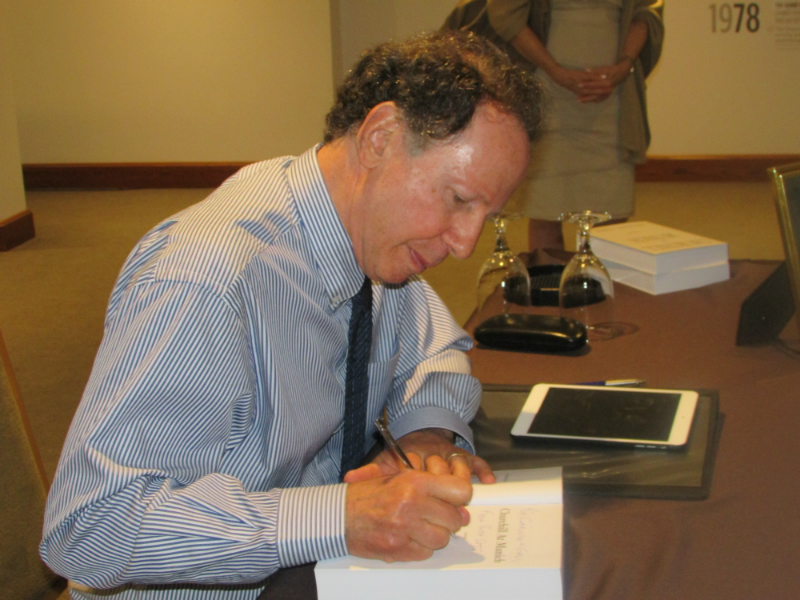What kind of world would we be living in if Winston Churchill, rather than Neville Chamberlain, went to Germany 80 years ago? What if the British government had refused to appease Adolf Hitler and a very different Munich Agreement of 1938 was hailed today as a triumph over tyranny and a watershed in the course of human history, rather than a disastrous miscalculation.
This is the premise for Michael Carin’s new novel, Churchill at Munich, a brilliantly imagined, exquisitely written and impeccably researched work.
In this work of fiction, Prime Minister Chamberlain is killed in an airplane crash on July 21, 1938, along with much of his cabinet, notably Lord Halifax, the foreign secretary who was the architect of the government’s appeasement policy on an increasingly expansionist and repressive Fuehrer.
There’s no sabotage, simply an accident that leaves the nation shell-shocked. Stepping into the political vacuum is Churchill, who was out of the government at the time (in reality, he became prime minister in May 1940.) The flamboyant Great War veteran and journalist, in defiance of his Conservative Party, has been raising the alarm over Nazi Germany, calling for Britain’s rearmament. He sees that Hitler is pure evil.
It’s not a popular stand with all Britons: many who are still reeling from the 1914-18 bloodbath denounce him as a warmonger.
Churchill at Munich is an epistolary novel consisting of letters by Joffrey Pearson, a low-level Foreign Office translator, to Heidi Lowell, a married Englishwoman living in Boston, for whom Pearson, who is also married, still carries a torch, from January 1936 to November 1938.
The love interest is evidently one-sided, as the reader never sees Lowell’s infrequent responses to his steady stream of missives. Carin, who was the editor of Montreal Business Magazine, has captured the voice of a middle-class Briton of the era with remarkable acuity. Through circumstances and an extraordinary talent for interpretation, this rather grey, weak-willed man is thrust into the midst of events that change the course of history.
Churchill, as a flesh-and-blood character, does not enter the story until after the crash, which is two-thirds through the almost 500-page book. But the suspense promised by the title is worth waiting for.
READ: MARY BERG AND THE WARSAW GHETTO
Pearson is a keen chronicler of the confusion in Britain over what was happening on the continent. And he symbolizes that ambivalence: his late mother was German, hence his masterful command of the language, and his senile English father, a retired minor diplomat and Great War veteran, is fervently anti-German.
In his workplace, Pearson’s colleagues are divided on the threat posed by Hitler and at home, his wife and precocious eight-year-old daughter idolize Churchill.
His estranged sister, who lives in Germany, is a rabid Nazi supporter. His best friend since childhood, Damon Chadwick, a gay artist whose paintings gain a lucrative patronage in Germany, even at the highest levels, appears to have become an outspoken traitor.
Going through the scores of letters preceding Munich is enjoyable in itself, but the crux of the story is truly gripping. Although Pearson is sworn to utmost secrecy, he continues to divulge everything to Lowell, believing she will burn all his letters.
Churchill has beefed up the military, but it is still no match for the German juggernaut. Hitler is threatening to annex Czechoslovakia’s Sudetenland on the pretext of liberating the “oppressed” German minority and invasion seems imminent.
Churchill and Foreign Secretary Anthony Eden (who, historically, had resigned from Chamberlain’s cabinet over the appeasement policy) fly to Munich on Sept. 27, 1938, to meet with Hitler and his foreign secretary, Joachim von Ribbentrop.
The only others in the room are Pearson and the German interpreter.
Churchill has ostensibly gone to offer an alternative to conflict: a federated system providing the Sudeten Volk a considerable degree of autonomy within Czechoslovakia. Churchill, of course, has no illusions that Hitler will acquiesce.
In reality, the British leader has not come to negotiate, any more than his obdurate, maniacal counterpart has. To avoid spoiling the thrill, let’s just say that Churchill has an ace up his sleeve that is so putrid, even Hitler makes an about-face and the Second World War never happens.
It can be revealed that Carin’s depiction of the cliff-hanging exchange between the two adversaries and his characterization of them as real people is chilling.
Churchill at Munich’s penultimate chapter is written by Heidi Lowell’s son, Maxwell, in the early 1980s, as the letters continue to be the subject of historical debate and popular controversy over their accuracy and even their authenticity.
The epilogue is left to Pearson’s daughter, Victoria, a professor emeritus of modern history at Cambridge University, who puts a scholarly perspective on what a turning point that 1938 Munich agreement was in the course of humanity.
By then (significantly, Sept. 12, 2001), democracy, prosperity and international co-operation rule around the globe.
Carin, an unqualified admirer of Churchill, believes that his unwavering leadership saved Western civilization and that it is tragic that he did not hold the reins of power earlier.
At the book’s launch, Carin said that another Churchill is urgently needed today. Democratic values are increasingly under threat – even in the United States – yet mediocrity, at best, is the response, he says.
